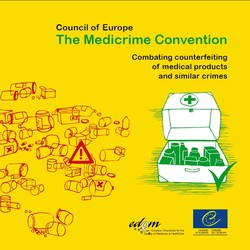Medicrime convention just weeks away from fruition
Phil Taylor, 01-Oct-2015
 With five countries now ratifying the Medicrime convention, the new legislative tool will come into effect on January 1, 2016, aiding the fight against falsified medicinal products.
With five countries now ratifying the Medicrime convention, the new legislative tool will come into effect on January 1, 2016, aiding the fight against falsified medicinal products.
Medicrime was drawn up in 2010 by the Council of Europe and establishes a framework for international cooperation in the fight against the production and distribution of counterfeit drugs. To date 24 countries have signed the convention and five have now fully ratified it - meaning they consent to be legally bound by the terms of the treaty - and this triggers its implementation.
It is the first international treaty to establish the manufacturing and supply of falsified/counterfeit medical products as a criminal offence, and also makes it illegal to falsify official documents relating to medicines, manufacture and supply drug products without authorisation, and market medicines without complying with industry standards.
Its overall aim is to remedy the situation that counterfeiting of medicines can be handled differently from a legal perspective between countries both in the CoE region and elsewhere. Medicrime is not concerned with intellectual property infringements but defines counterfeit as products with a 'false representation as regards identity and/or source'.
It also has a very broad scope, including not only finished medicinal products but also active and inactive ingredients and other components or accessories.
Organisations representing the pharmaceutical industry have welcomed the news, noting that it will help to ensure international cooperation between the competent health, police and customs authorities.
"This marks the beginning of a new era in our collective efforts to criminalise the production and distribution of counterfeit medicines and to shine a light on a dangerous business that puts patients at risk," said the groups, which include representatives of brandname and generic medicines producers.
"Counterfeit medicines, which are mainly linked to organized crime, have considerably grown in recent years, given the high profits and opportunities offered to criminals, including through the spread of e-commerce," commented Richard Bergstrom, director of the European Federation of Pharmaceutical Industries and Associations (EFPIA).
"Yet, in many countries, the trade of counterfeit medical products is even less sanctioned than selling narcotics for instance and such impunity does come at the detriment of patients’ health," he added.
The countries that have ratified the convention are CoE members Ukraine, Spain, Hungary, Moldova and non-member Guinea.
Related articles:

©
SecuringIndustry.com




 With five countries now ratifying the Medicrime convention, the new legislative tool will come into effect on January 1, 2016, aiding the fight against falsified medicinal products.
With five countries now ratifying the Medicrime convention, the new legislative tool will come into effect on January 1, 2016, aiding the fight against falsified medicinal products.